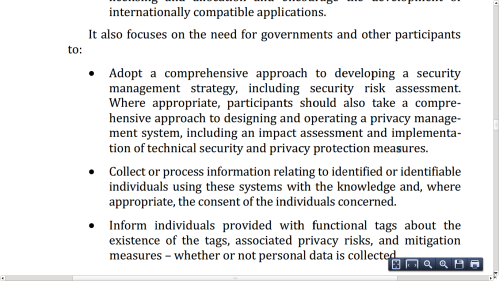I really liked revisiting these privacy principles at http://oecdprivacy.org/
I wonder if the internet uses them??
The OECD Privacy Principles are part of the OECD Guidelines on the Protection of Privacy and Transborder Flows of Personal Data, which was developed in the late 1970s and adopted in 1980.
1. Collection Limitation Principle
There should be limits to the collection of personal data and any such data should be obtained by lawful and fair means and, where appropriate, with the knowledge or consent of the data subject.
2. Data Quality Principle
Personal data should be relevant to the purposes for which they are to be used, and, to the extent necessary for those purposes, should be accurate, complete and kept up-to-date.
3. Purpose Specification Principle
The purposes for which personal data are collected should be specified not later than at the time of data collection and the subsequent use limited to the fulfilment of those purposes or such others as are not incompatible with those purposes and as are specified on each occasion of change of purpose.
4. Use Limitation Principle
Personal data should not be disclosed, made available or otherwise used for purposes other than those specified in accordance with Paragraph 9 except:
a) with the consent of the data subject; or
b) by the authority of law.
5. Security Safeguards Principle
Personal data should be protected by reasonable security safeguards against such risks as loss or unauthorised access, destruction, use, modification or disclosure of data.
6. Openness Principle
There should be a general policy of openness about developments, practices and policies with respect to personal data. Means should be readily available of establishing the existence and nature of personal data, and the main purposes of their use, as well as the identity and usual residence of the data controller.
7. Individual Participation Principle
An individual should have the right:
a) to obtain from a data controller, or otherwise, confirmation of whether or not the data controller has data relating to him;
b) to have communicated to him, data relating to him
i) within a reasonable time;
ii) at a charge, if any, that is not excessive;
iii) in a reasonable manner; and
iv) in a form that is readily intelligible to him;
c) to be given reasons if a request made under subparagraphs (a) and (b) is denied, and to be able to challenge such denial; and
d) to challenge data relating to him and, if the challenge is successful to have the data erased, rectified, completed or amended.
8. Accountability Principle
A data controller should be accountable for complying with measures which give effect to the principles stated above.
News
Other Privacy Frameworks
APEC Privacy Framework
The Asia-Pacific Economic Cooperation (APEC) Privacy Framework overlaps with other frameworks; however, it concentrates on actual or potential harm as a result of disclosing information, rather than individuals’ rights pertaining to their information
The Internet Economy on the Rise:
Progress since the Seoul Declaration
Published in September 2013, this book reviews progress made since the 2008 OECD Seoul Declaration for the Future of the Internet Economy and identifies areas for future work.
Overall, the review shows that the Internet economy has become a new source of growth, with the potential to boost the whole economy, to foster innovation, competitiveness and user participation, and to contribute effectively to the prosperity of society as a whole.
The OECD Policy Guidance for Protecting and Empowering Consumers in Communication Services (Annex B) addresses some of the key issues currently facing consumers in this market.
The guidance advocates:
Informing consumers about potential security and privacy risks in using communication services and available measures to limit these risks.
The OECD Policy Guidance on Radio Frequency Identification (Annex C) encourages research on the economic and social impacts of such technologies The guidance points out the need to prevent and mitigate security risks and to address privacy concerns arising when information relating to an identified or identifiable individual is collected or processed. 
AJAY- So the guidelines are there. But who all are following them and who aren’t?
Revised Principles-
http://www.oecd.org/sti/ieconomy/2013-oecd-privacy-guidelines.pdf


28.635308
77.224960






